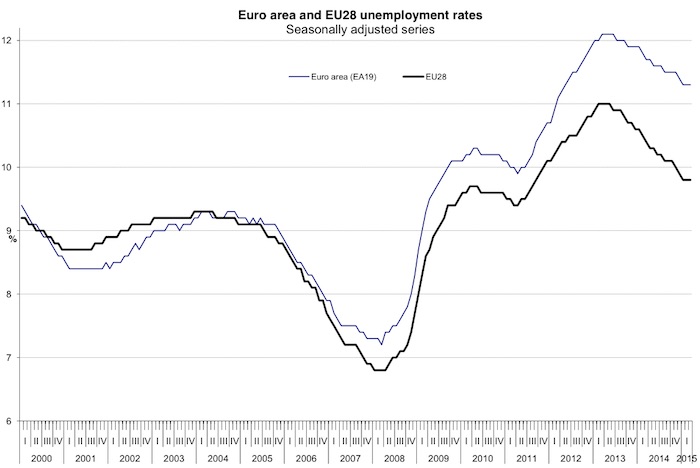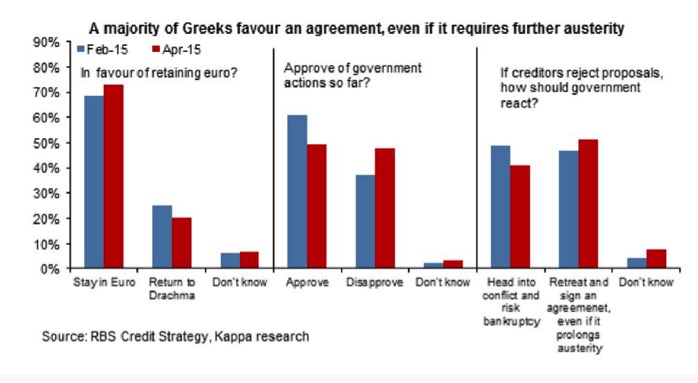Bill Mitchell-en Friday lay day – the hopelessness of the Greek situation1
Eurostat-ek lan-indarrari buruz, bere azken txostena plazaratu du (April 30, 2015) – Euro area unemployment rate at 11.3%. Datuak adierazgarriak dira. Euroguneko suspertze ekonomikoaren gaineko hitz jarioetatik at, hauxe irakur daiteke:
“…the unemployment remains at 11.3 per cent in March 2015 (no change on February 2015) and only 0.4 per cent lower than a year ago (March 2014). The Greek unemployment rate remains at 25.7 per cent (as at January 2015) and more than 50 per cent of 15-24 year olds are unemployed.”
Hona hemen langabezia grafikoa, 2000tik 2015era:
2008ko igoera zorrotza Finantza Krisi Handiari dagokio; ondorioz egon ziren defizit fiskal igotzaileak zirela eta, egoera egonkortu zen %10aren inguruan. Eliteek Stability and Growth Pact izeneko neurriak (%3 ospetsua) plazara atera izan ez balituzte, 2010 eta 2011n azaldu zen beheraldiak segituko ahal zukeen.
Baina eurogunean zehar behartu zen austeritate gogorraren ondorioz, langabezia tasak erabat altxatu ziren. Beharrezkoak ez ziren neurriak, noski.
Gaur egun espekulazio pilo bat dago Greziako gobernua ea noiz geratuko den dirurik gabe, bera ez delako moneta jaulkitzailea. Ez badute fondo gehiago lortu Troikatik, orduan hilabete gutxi barru gertatuko da porrota.
Barnetik, Syrizak zailtasunak ditu jubilatuei pentsioak ordaintzeko, baita zerbitzu publiko langileei soldatak ordaintzeko ere.
Badirudi azkeneraino iritsi dela.
Mitchell-ek, alta, hauxe dio:
“But the worst news I saw this week related to the results of a survey of Greek people about the current situation. It tells me that things are very desperate indeed.”
Mitchell-ek berriz aipatzen du Stathis Kouvelakis2.
Aipatutako bi sarrera horietan dagoena ez dugu berriz errepikatuko.
Mitchell-ek honela segitzen du:
“The conservatives (right-wingers) and the Euro elites continue to equate exit with an “apocalypse”. That has been a constant theme in all of this as Greece goes further into Depression.”
Stathis Kouvelakis-ek, aldiz, Syriza EUkoekiko konfrontazioan egon dadin nahi du, herri mugimendu bat eta Greziako gizarte bera ere bultzatu guraz Syrizak beste ildo erradikalago bat, ezberdin bat har dezan, hala barnean nola nazioarteko mailan.
Baina inkesta berri bat egin dute ‘afera argitzeko’3.
Hona hemen inkestaren emaitzak:
Mitchell-en iritziz,
-
Inkestak nolabaiteko etsipenaren gradua erakusten du
-
Harrigarria da Greziako gehiengo batek atzera egitearen eta oraingo austeritatearen segidaren alde dagoela baldin eta euro eliteek Syrizari ematen ez badiote sostengurik
-
Euroaren aldeko sostengua gero eta handiagoa da
Nahiz eta Syrizak berriz ere hauteskundeetara jo, Troikarekiko akordio zentzudunaren negoziazioak porrot egin eta gero, zaila da inkestaren ikuspegi horiek aldatzea.
Bai, Syrizak hauteskundeetan irabazi zuen joan den urtarrilean. Baina haren agindua ez dator bat errealitate politikoarekin.
Zer pentsatu zuen jendeak Syriza aukeratu zutenean? Argi dago iritzi publikoan nahaste masibo bat dagoela Grexit-en ondorioez eta ondorio horien errealitateaz.
Alarmak mehatxu bat lortu du.
Populazioak etengabeko gelditasuna nahiago du, eurotik irtetea baino.
“In the Bloomberg Business article (April 27, 2015) – Greece’s Day of Reckoning Inches Closer as Payments Loom – we learn that:
… 71.9 percent of those surveyed said a deal with creditors would be best for the country, while 23.2 percent said they prefer a clash. An Alco survey in Proto Thema newspaper showed that half of respondents want a compromise even if creditors reject Greek government demands, while 36 percent said the government should opt for a “rupture.””
Baldin eta Syrizak hauteskunde berrietarako deitzen badu, segur aski irabaziko du, gaur egungo inkestak kontuan harturik. Baina austeritaterako irabazia izango litzateke, zeina ez baita inongo irabazirik.
And the Greek Finance Minister would ride off on his motorbike without achieving much at all.
Twiterrak, 2015.05.01:
@billy_blog Seems the history of local control of their currencies is telling the populations loud and clear they are better off in the EU?
@billy_blog The challenge is to effect change in EU policy before blood in the streets drives far less attractive alternatives
@wbmosler History would tell us Warren that EU policy is resistant to the fundamental changes required to avoid the worsening situation
@billy_blog Yes, it’s been an ongoing 20 year self perpetuating slow motion train wreck
2 Ikus: Syrizaren denbora bukatuz doa…: https://www.unibertsitatea.net/blogak/heterodoxia/2015/03/25/syrizaren-denbora-bukatuz-doa. Halaber, ikus Grexit ala kapitulazioa?: https://www.unibertsitatea.net/blogak/heterodoxia/2015/04/12/grexit-ala-kapitulazioa/.
3 Ingelesez: “But a recent poll taken by the Greek polling firm Kappa Research illustrates the problem that those who wish to promote a Eurozone exit instead of the mind-boggling continuation of austerity face.
It was published in the Greek newspaper – To Vima – which is a centrist leaning paper with strong political credibility. It “is politically aligned with the centrist (reformist) wing of the Greek … party PASOK”, so it is little wonder it seeks to promote pro-Euro ideas.”







joseba says:
Greek Pensioners Crash Pension Fund Board Meeting, Form Lines At Bank
http://www.zerohedge.com/news/2015-05-01/greek-pensioners-crash-pension-fund-board-meeting-form-lines-bank
joseba says:
Comment on Spain’s situation:
http://bilbo.economicoutlook.net/blog/?p=30780&cpage=1#comment-38791